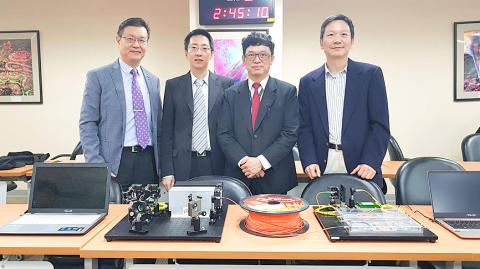A team of researchers at National Tsing Hua University (NTHU) yesterday unveiled a new cryptographic technique using quantum technology, saying that they have used it to transmit an encrypted message outside of a laboratory setting.
The team in September sent encryption keys from their university to a recipient at National Chiao Tung University via a 4km fiber-optic cable, NTHU department of physics associate professor Chuu Chih-sung (褚志崧) told a news conference at the Ministry of Science and Technology in Taipei.
The researchers used pulsed laser light to produce photons — the smallest measurable unit of light — on which they encoded binary code, he said.

Photo: Chien Hui-ju, Taipei Times
The technique, which is based on a theory of differential phase shift quantum key distribution introduced by Stanford University researchers in 2002, frustrates any hacker’s attempt to steal the code, Chuu said.
As the system tolerates an error rate of up to 2.5 percent when there is no “eavesdropper” trying to steal the code, it can detect any theft attempt as the error rate would exceed 2.5 percent, he said.
While the US, China and other countries have conducted similar experiments at various distances, the NTHU team is the first in Taiwan to transmit encrypted keys using quantum communication in a real-world environment, Chuu said.
The team next plans to experiment using the technique to transmit encrypted keys up to 10km to the Industrial Technology Research Institute, he said.
Compared with contemporary cryptography, whose encrypted messages can be deciphered by supercomputers with “faster” computing capabilities, the quantum key distribution technique makes the formulas of keys more irregular, increasing the challenges for hackers, department distinguished professor Mou Chung-yu (牟中瑜) said.
The technique would be most applicable to the financial and national security sectors, Mou said.
As semiconductor manufacturing techniques have been pushed almost to their extremes, quantum computing, widely considered to be the next significant technological revolution, is one of the ministry’s priority areas when allocating funds, Deputy Minister of Science and Technology Shieh Dar-bin (謝達斌) said.
The ministry last year provided funding for NTHU to establish the Center for Quantum Technology and is glad to see that researchers have produced preliminary results, Shieh said, adding that he expects the team’s technique to be applied to communication at longer ranges.

NATIONAL SECURITY THREAT: An official said that Guan Guan’s comments had gone beyond the threshold of free speech, as she advocated for the destruction of the ROC China-born media influencer Guan Guan’s (關關) residency permit has been revoked for repeatedly posting pro-China content that threatens national security, the National Immigration Agency said yesterday. Guan Guan has said many controversial things in her videos posted to Douyin (抖音), including “the red flag will soon be painted all over Taiwan” and “Taiwan is an inseparable part of China,” while expressing hope for expedited “reunification.” The agency received multiple reports alleging that Guan Guan had advocated for armed reunification last year. After investigating, the agency last month issued a notice requiring her to appear and account for her actions. Guan Guan appeared as required,

Japan and the Philippines yesterday signed a defense pact that would allow the tax-free provision of ammunition, fuel, food and other necessities when their forces stage joint training to boost deterrence against China’s growing aggression in the region and to bolster their preparation for natural disasters. Japan has faced increasing political, trade and security tensions with China, which was angered by Japanese Prime Minister Sanae Takaichi’s remark that a Chinese attack on Taiwan would be a survival-threatening situation for Japan, triggering a military response. Japan and the Philippines have also had separate territorial conflicts with Beijing in the East and South China

A strong cold air mass is expected to arrive tonight, bringing a change in weather and a drop in temperature, the Central Weather Administration (CWA) said. The coldest time would be early on Thursday morning, with temperatures in some areas dipping as low as 8°C, it said. Daytime highs yesterday were 22°C to 24°C in northern and eastern Taiwan, and about 25°C to 28°C in the central and southern regions, it said. However, nighttime lows would dip to about 15°C to 16°C in central and northern Taiwan as well as the northeast, and 17°C to 19°C elsewhere, it said. Tropical Storm Nokaen, currently

PAPERS, PLEASE: The gang exploited the high value of the passports, selling them at inflated prices to Chinese buyers, who would treat them as ‘invisibility cloaks’ The Yilan District Court has handed four members of a syndicate prison terms ranging from one year and two months to two years and two months for their involvement in a scheme to purchase Taiwanese passports and resell them abroad at a massive markup. A Chinese human smuggling syndicate purchased Taiwanese passports through local criminal networks, exploiting the passports’ visa-free travel privileges to turn a profit of more than 20 times the original price, the court said. Such criminal organizations enable people to impersonate Taiwanese when entering and exiting Taiwan and other countries, undermining social order and the credibility of the nation’s